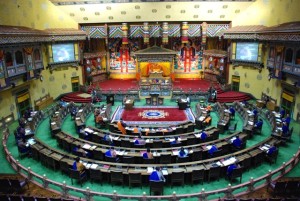The National Council on 19th November sought more justifications on the recommendation to liberalize the daily tourism tariff from its Economic Affairs Committee before it endorses the report.
Some of the issues the house mulled over at length were whether Bhutan should drop the daily tourism tariff and leave it to the market forces and what could be the likely consequences of such a move.
The tariff remodelling recommendation is at the core of its Economic Affairs Committee’s yearlong tourism policy review report.
The committee had recommended keeping the royalty portion of the tariff and leaving the rest to be determined by the tour operators.
Trongsa Councillor Tharchen supporting the move said the fixed tariff until now had confined the business in the hands of a few.
He said if the country is to spread tourism benefits to other parts of the country and accomplish quality tourists with maximum revenue, liberalising is the way forward.
“Of the 1,700 tour operators, about 90 percent get only 30 percent of the tourist arrivals, while the rest goes to the top 10 operators,” he said.
He said even the Royal Monetary Authority had proposed to liberalise the tariff.
Despite the chairperson’s repeated calls for brevity and the session stretching beyond normal hours, the members pounded the committee with issues and concerns.
Eminent member Tashi Wangmo asked if it was necessary to liberalise the tariff.
“We should first explore administrative and management measures to solve the problems of undercutting,” she said.
She said one of the advantages of the fixed tariff was that the country could remain as a high-end tourist destination.
“If we leave the tariff determination to the market forces, the danger is that the sector could be solely driven by commercial interests and could encourage mass tourism,” she said.
Members also said that when the daily tariff becomes competitive, tour operators in desperation for business could further undercut.
“How can we ensure that the liberalisation of tariff would not benefit only the select few?” Bumthang Councillor Nima asked.
The committee’s chairperson and Chukha Councillor Pema Tenzin said tourism industry businessmen have been calling him saying they appreciate the committee’s recommendations and sharing their concerns.
“For the past 10 years they have been discussing this issue but nothing came out of it,” Pema Tenzin said.
Committee members said some vested interest groups prevented the proposed changes to the tariff until now.
“The fixed tariff really affects the service industry, which has been until now held at the mercy of the tour operators,” Dasho Tashi Wangyel said.
Committee members said the proposed pricing would not lead to mass tourism and poor quality of tourists.
“When prices become competitive, tour operators will come up with many tourism products from various parts of the country, which would actually benefit areas not touched until now,” Zhemgang Councillor Pema Dakpa said.
Deputy chairperson and Haa Councillor Tshering Dorji proposed increasing the royalty and doing away with peak and lean seasons rates as well.
Members said regional tourists should also be treated the same as international tourists.
“They have to be offered the same standard of services and care, for which a certain charge could be levied,” Bumthang Councillor Nima said. “At present, the tourists are processed in the same immigration office that deals with foreign labourers. This needs to change.”
Gasa Councillor Sangay Khandu proposed that regional tourists’ vehicles should also be levied green tax like the local ones.
Thimphu Councillor Nima Gyaltshen said unregulated regional tourist posed risk to the sustainability of the subsidised fuel.
Members said the regional tourists could not be blamed for the problems arising from lack of policy and proper mechanisms in the country.
“We need to urgently have a policy and other measures so that even our regional tourists can have an enjoyable experience and avert problems,” a member said.
The house will vote on the recommendations next week.
Source: Kuensel (Tshering Palden)

